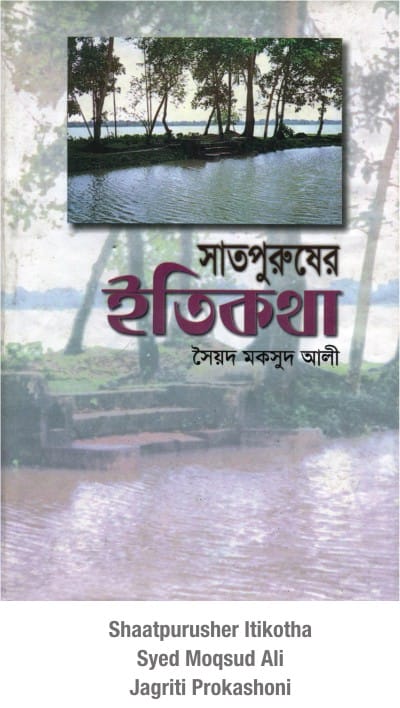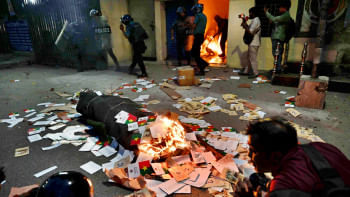Of values that used to be, of culture that yet remains

Old values are what Syed Moqsud Ali speaks of in this narrative of what has been a fruitful life. In a work that encompasses an entirety of a family tale, the writer in essence brings forth all the traditions, as it were, that once were an underpinning of life in this country. These are the writer's memoirs and yet they could be interpreted as expressions of the sentiments that have bound Bengali families and clans together for ages. All history begins with the personal before broadening out to a wider swath of experience. And that is the point which Ali makes at the beginning of his narrative. He goes out in search of his roots and comes away from the density of tradition enriched in terms of his discovery. It is discovery that most, if not all, of us can relate to. There is that identification not just with class but with the accompaniments of aspirations which come with it as well.
The thoughts of the writer straddle diverse points of history. He belongs to a generation born in the British colonial era, at nearly the point where Indian nationalism has begun to energise people with the necessary dream of freedom. It is 1925 when Syed Moqsud Ali is born. For those with a sense of subcontinental history, it is also the year when the inspiring Chittaranjan Das passes away, relatively young and in demand on an all-India basis. Ali passes into youth acutely conscious of the demands that swift developing history is making on him and on those around him. There is that sense of inevitability about politics that he goes through, as do so many others, in the build-up to Partition. Lives go through a certain twisting of the knife, and some are left wrecked forever. For Ali, life simply goes through different layers in the early days of the Pakistan state. It is an idealistic young man who takes leave of his parents and his siblings in his village and makes his way to Dhaka. The classes at Dhaka College are but a turning of the page, for they are the springboard that will carry him far. His intellect, to anyone who must have come across him in those times, must have reflected the promise in him.
And the promise was to be fulfilled. He would find his way to academia, through the meandering and yet defining routes of knowledge-based ambition. Along the way, he would find a wife, an equally enlightened and accomplished individual. He would find fulfillment in life with Noorun Nahar Fyzennessa; the love between them would endure and gather newer substance over the years. Both would travel abroad for higher education. Both would come back home, in all their liberality, to be part of a growing circle of Bengali nationalist culture. It is part of the overall image the writer captures, in sequences, through his telling of the tale. While politics naturally pulls him into an awareness of his self, into a vortex, there is also the domesticity that keeps the writer rooted to the ground. He glows at news of his first-born. It is the safety of this first child, Saad, that would years down the road, in 1971, keep Ali and Noorun Nahar worried. Saad is a friend of Rumi's --- and Rumi is the bright young son of Jahanara Imam who would lose his life at the hands of the Pakistan army. For his part, Saad, stopped at an army checkpoint, would escape certain misery through simply making a dash for life towards Comilla. His parents dote on him, as they do on their second child Sadya Afreen. On an educational tour of West Pakistan at the head of a group of Bengali students in the 1960s, Ali takes Sadya along and vicariously experiences the raptures of excitement the child goes through in a milieu different from the one she is rooted in. That Sadya takes a road to musical accomplishment is a story he relates with undisguised pleasure. That she becomes the daughter-in-law of Azizur Rahman Mallick and carries on with her education, even as she becomes a mother, is an account that only a happy Bengali father can offer to the reader.
And Ali does that, in the case of Saad and Sadya as also in that of their younger children, the volleyball-loving Nazia and Arastu, the baby of the family. The marriages of his children, the birth of his grandchildren, et al, and the resultant happiness in him, all fall within the timelessness of Bengali family tradition. Sadya's wedding swiftly turns into a celebration of contemporary history, with the entire leadership of free Bangladesh --- Bangabandhu and the Mujibnagar pioneers --- turning up for the occasion. As the writer sees it, it is a tale that adds to the beads in the garland from generation to generation. But that does not detract from the fact of the tragedy visited on the nation only years earlier. On 25 March 1971, as the state of Pakistan goes full-scale into the odious job of trying to wipe the land clean of Bengali political aspirations, Syed Moqsud Ali and Noorun Nahar Fyzennessa gather their children close, appalled at the ferocity of the state. It is ferocity that will claim the lives of millions. When the war is over, it is the viciousness of the enemy that is writ large across the landscape. Ali visits a shell-shocked Jahanara Imam. The loss of a husband, followed by that of a son, gleam tragically in the vacancy of Imam's eyes. On a trip to his village soon after liberation, Ali is quite unable to comprehend the decline that has set in. Unkempt roads, dilapidated government buildings and plain unruly behaviour on the river vessel carrying him from the capital to his village bring home to him a sense of the intrigue that might already be undermining the new-born state. The intrigue, in the brief span of three and a half years, turns into full-blown conspiracy. The killings of 1975 put paid to collective Bengali aspirations. Values are beginning to be a casualty.
Shaatpurusher Itikotha is the history of a family encompassed in the consciousness of its passing generations. It is something more. The frightened young university student making his way to the Alis' university quarters in the early moments of genocide, Nazia Jabeen dancing her way into the room to make the announcement that she has passed her school leaving examinations, Ali presiding over the political science department of Dhaka University as its chairman, Noorun Nahar Fyzennessa taking over as provost of Rokeya are images that flash by.
And as they do, it is the canvas of a lost era, somewhat more innocent and more purposeful than the times we live through today, that comes alive. Syed Moqsud Ali has lived a full life. You feel it in the conversational tone flowing through this highly readable work.

 For all latest news, follow The Daily Star's Google News channel.
For all latest news, follow The Daily Star's Google News channel. 



Comments